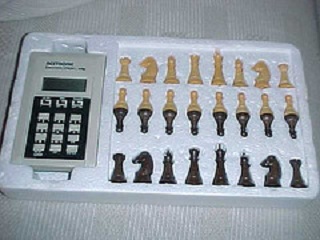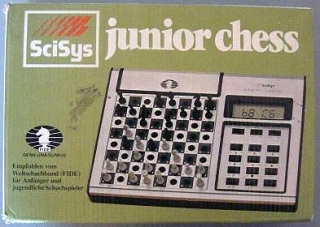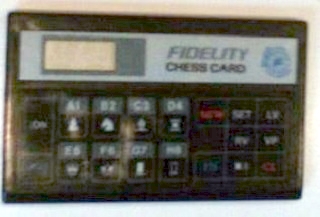Mini Chess

Mini Chess, (SciSys Mini Chess)
along with Junior Chess and Graduate Chess, a series of portable dedicated chess computers manufactured and sold by SciSys, first released in early 1981. The computers had a Hitachi HD44801 4-bit CMOS microcontroller with 2K of 10-bit word ROM, 128 10-bit words of pattern ROM supported by pattern generation instructions with table lookup capability, and 160 nibbles or digits (80 bytes) of RAM, running at 400 KHz. The programs were delivered by Philidor Software, developed by Mark Taylor under guidance of David Levy, who contributed the basic chess algorithm [2] including promotions, en passant, and castling, and even managed mate with KR v K in some versions all in astonishing 160 nibbles of RAM. A piece of work that Mark Taylor is still rightly proud of today [3].
Contents
160 Nibble Challenge
160 nibbles of RAM is a challenge. The HD44801 has an internal 4 word return stack, so one may assume a maximum search depth of 4, but one has to be careful with external interrupts, i. e. from keyboard or timer, since they cause an implicit call to an interrupt handler, pushing the instruction pointer on the internal stack as well, with the possibility to cause an stack overflow. One may better implement a simple iterative search, called after making a move at the root within its iterative deepening framework.
The board is apparently represented by an incremental updated 8x8 array of nibbles. The ply stack entry consists of en passant- and castling rights, the move to unmake, likely 3 nibbles 12-bit from-to encoding also interpreted as state of a deterministic move generator, and alpha, while beta might be restored from alpha of the previous ply in negamax manner. Of course, with such a minimalistic design, move ordering is a big issue, and how to utilize the remaining nibbles in a most efficient manner, considering MVV-LVA and possibly maintaining a small triangular PV-table say for four plies.
Derivatives
Mini Chess was the basic model with keypad and seven-segment LCD to display move coordinates and small status messages, also sold in the UK under the marketing company name Acetronic.
Junior Chess

Junior Chess had almost the same hardware and program than Mini Chess, but an integrated travel pegboard.
Graduate Chess
Like Junior Chess, Graduate Chess was almost identical to Mini Chess, also with an integrated travel pegboard.
CXG
The 4-bit program initiated Eric White's involvement in computer chess business and long time collaboration with Levy, when Hong Kong based manufacturer White and Allcock, forerunner of Newcrest Technology introduced the CXG brand in 1981 with CXG Sensor Computachess [5] [6]. It was further adapted for the more advanced HMCS40 4-bit singlechip processor [7].
Chess Cards

In the late 80 and early 90, the 4-Bit program appeared in low cost chess card computers by CXG [9] and Fidelity Electronics [10], at that time already acquired by Hegener & Glaser.
See also
- Chess Champion Pocket Chess
- Junior
- Mini
- Move Generation with 256 bytes RAM or less?
- Novag Micro Chess
- Philidor Software
External Links
- Chess Computers - The UK Story from Chess Computer UK by Mike Watters
- Scisys and Novag : The Early Years from Chess Computer UK by Mike Watters
- Scisys/Saitek | Photo collection by Chewbanta
Mini Chess
- Mini Chess from Chess Computer UK by Mike Watters
- Mini Chess | My Chess Computers
- SciSys Mini Chess from Schachcomputer.info - Wiki (German)
Junior Chess
- Junior Chess from Chess Computer UK by Mike Watters
- Scisys Junior Chess | My Chess Computers
- SciSys Junior Chess from Schachcomputer.info - Wiki (German)
Graduate Chess
Chess Cards
- Fidelity Chess Card Electronic Chess Computer from The Spacious Mind
- Ismenio's chess computer collection | Fidelity Chess Card 6115
- CXG Pocket Chess from Schachcomputer.info - Wiki (German)
- CXG Sphinx Chess Card from Schachcomputer.info - Wiki (German)
- Fidelity Chess Card from Schachcomputer.info - Wiki (German)
- Fidelity Chess Pal from Schachcomputer.info - Wiki (German)
- Fidelity Micro Chess Challenger from Schachcomputer.info - Wiki (German)
References
- ↑ Acetronic from Scisys/Saitek | Photo collection by Chewbanta
- ↑ David Levy interview from Schachcomputer.info - Wiki
- ↑ Chess Computers - The UK Story from Chess Computer UK by Mike Watters
- ↑ Junior Chess with FIDE recommendation for novice and junior chess players, Scisys/Saitek | Photo collection by Chewbanta
- ↑ CXG Sensor Computachess from Schachcomputer.info Wiki
- ↑ CXG Pocket Chess from Schachcomputer.info Wiki
- ↑ HD614048_511862.PDF Datasheet Download --- IC-ON-LINE
- ↑ Fidelity Chess Card from Exotic: Photo collection by Chewbanta
- ↑ CXG Sphinx Chess Card from Schachcomputer.info - Wiki
- ↑ Fidelity Chess Card from Schachcomputer.info - Wiki (German)